In the wake of the Cambridge Analytica scandal, which saw raw data from some 87 million Facebook users harvested without their knowledge, netizens have been increasingly concerned about protecting their privacy on social media.
The European Union’s GDPR (General Data Protection Regulation) that recently went into effect (as anyone with an email inbox could not have failed to notice), is part of the push to counter future privacy breeches.
Beyond policy, there is a growing bevy of startups aimed at keeping our social data safe. Given Israel’s prowess in cybersecurity, the Startup Nation has not surprisingly jumped to the fore as one of the leaders in preventing hackers from accessing our accounts and keeping social-media bullies at bay.
A 2017 Haaretz study identified 57 cyber privacy startups based in Israel dedicated to protecting users’ private information online, including via social media. ISRAEL21c takes a look at nine of them. Tell us about your favorites in the comments below.
The first step in staying safe on social media is knowing which third-party apps have access to your data. Tel Aviv-based MyPermissions has analyzed more than 3 million apps, creating a massive database of who talks to whom in the app world.
Want to know if that photo app has access to your location or if your contacts are being shared with your ride-sharing app? Download and run MyPermissions and you’ll get an instant snapshot of your social-media privacy status.
MyPermissions’ Privacy Cleaner app then runs in the background to prompt you against sharing sensitive information without your knowledge and to help revoke any permissions you may have unwittingly given with a single click. MyPermissions is now working on a new app, MyPrivacy, which will provide a suite of consumer privacy solutions designed for non-technical people.
Facebook’s Mark Zuckerberg may insist that users always have a right to disable cookies and safeguard their data, but how many users know how to do that – let alone actually take action? “The key point is being proactive instead of reactive,” says Yoav Degani, CEO of the six-year-old company. “You don’t need to wait for Facebook to make changes.”
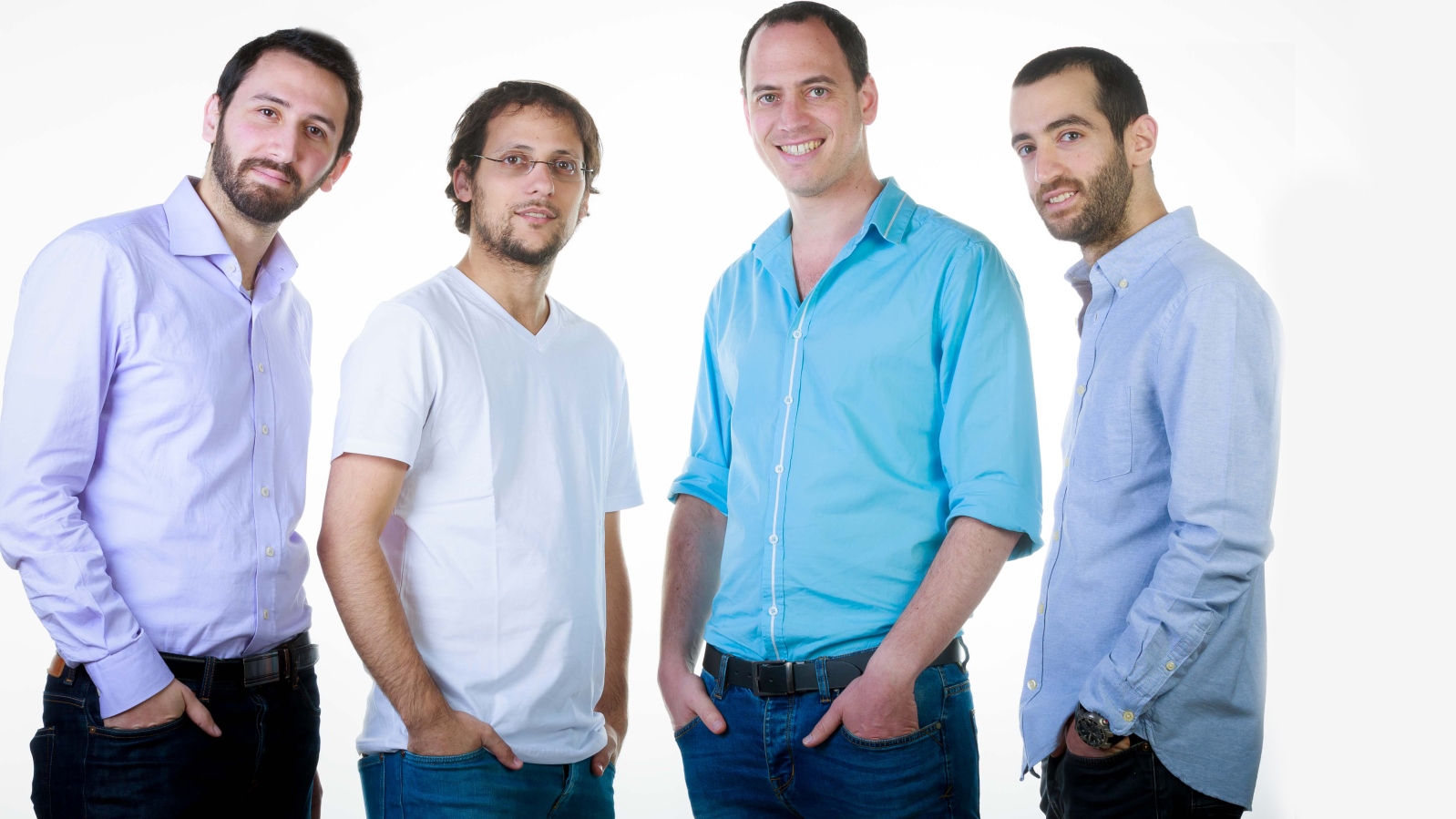
It’s one thing to know which apps have access to your data. What about your friends on social media – how do you know if they’re even real? If they’re not, the pictures and status updates you share with them may be used in unscrupulous ways.
Yossef Daar, co-founder of Cyabra, claims there are 140 million fake accounts on Facebook and 38 million on LinkedIn, and 48 million bots on Twitter. Cyabra helps ferret out the real from the fraudulent. Its clients are mostly corporate – security (including politicians), communications, PR and marketing.
Cyabra uses artificial intelligence and machine learning to detect fake news and fake users. Hundreds of parameters are analyzed by Cyabra’s algorithms, with each piece of information individually rated and compiled into a comprehensive report.
Cyabra, which has raised $1 million in seed funding (led by TAU Ventures), was chosen to participate in The Bridge commercialization program cosponsored by Coca-Cola, Turner and Mercedes-Benz. A former Mossad deputy director, Ram Ben-Barak, is on the company’s board of directors
With GDPR now the law across Europe and with similar rules on their way in Canada, Australia, China and Japan, ensuring that a user’s data remains private is more important than ever.
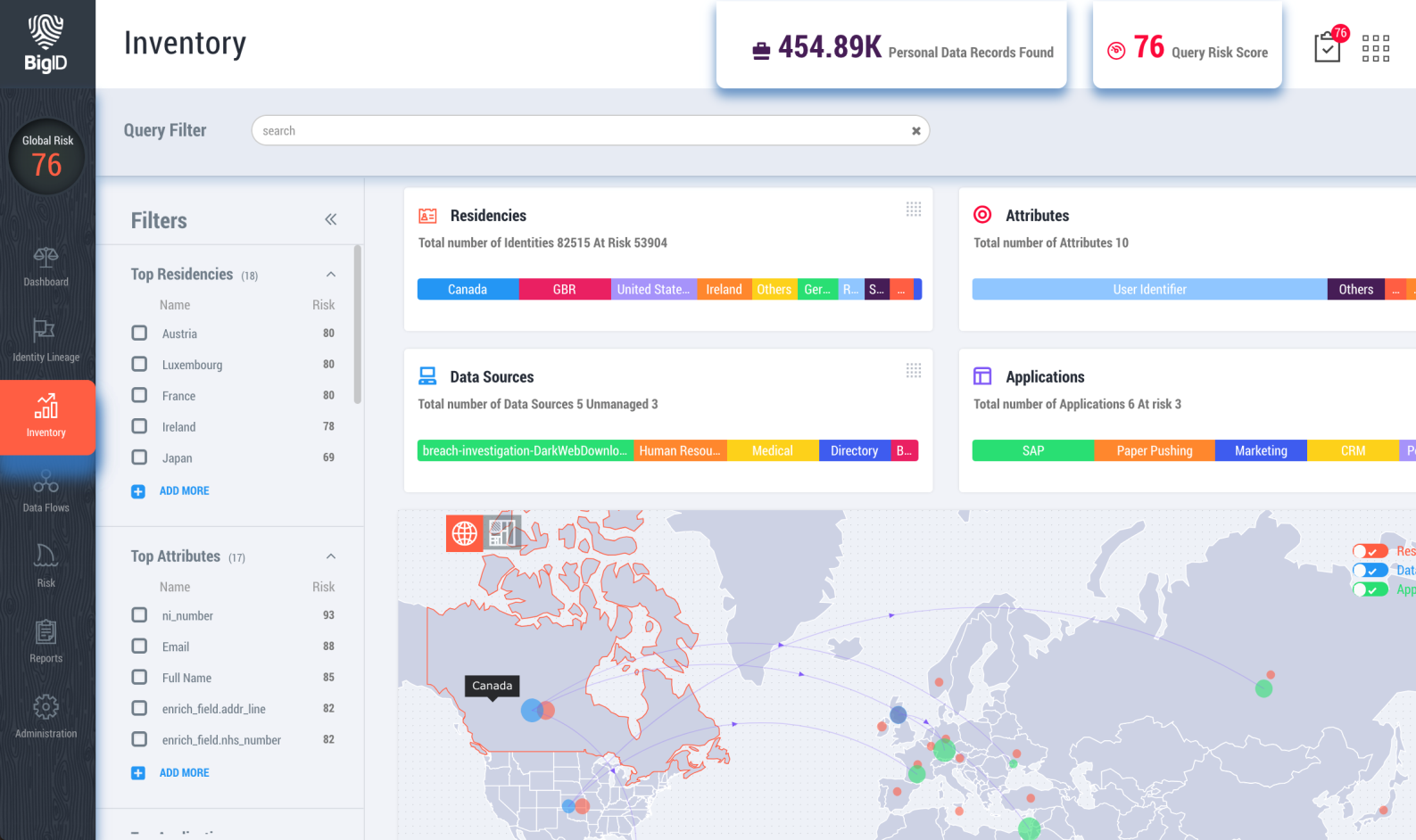
BigID, which has headquarters in New York and R&D in Tel Aviv, enables its corporate clients to inventory and identify the most sensitive bits of information from among vast stores of data – including social media.
Thanks to GDPR, the two-year-old company is seeing a lot of new business. “The market is changing [and] demanding more technology-based controls over how data is being used,” BigID CEO Dimitri Sirota told TechCrunch.
The company closed a $30 million Series B round in June. That was just a few months after closing an initial $16 million. BigID says it can find personal data in any language with 97 percent accuracy.
You can withdraw money, cross a border or unlock your mobile phone using your face as an identifier. The latest version of Facebook even lets you login with your picture. But “unlike passwords, you cannot change your face,” points out Gil Perry, CEO of Israeli cybersecurity startup D-ID.
And that opens the door to hackers getting access to your data by stealing your picture.
D-ID has built a “firewall” to block facial recognition. D-ID’s software subtly alters stored pictures, just enough to escape detection by facial-recognition algorithms. Look at two pictures side-by-side and you’ll notice the difference, although on its own, the manipulated picture appears normal.
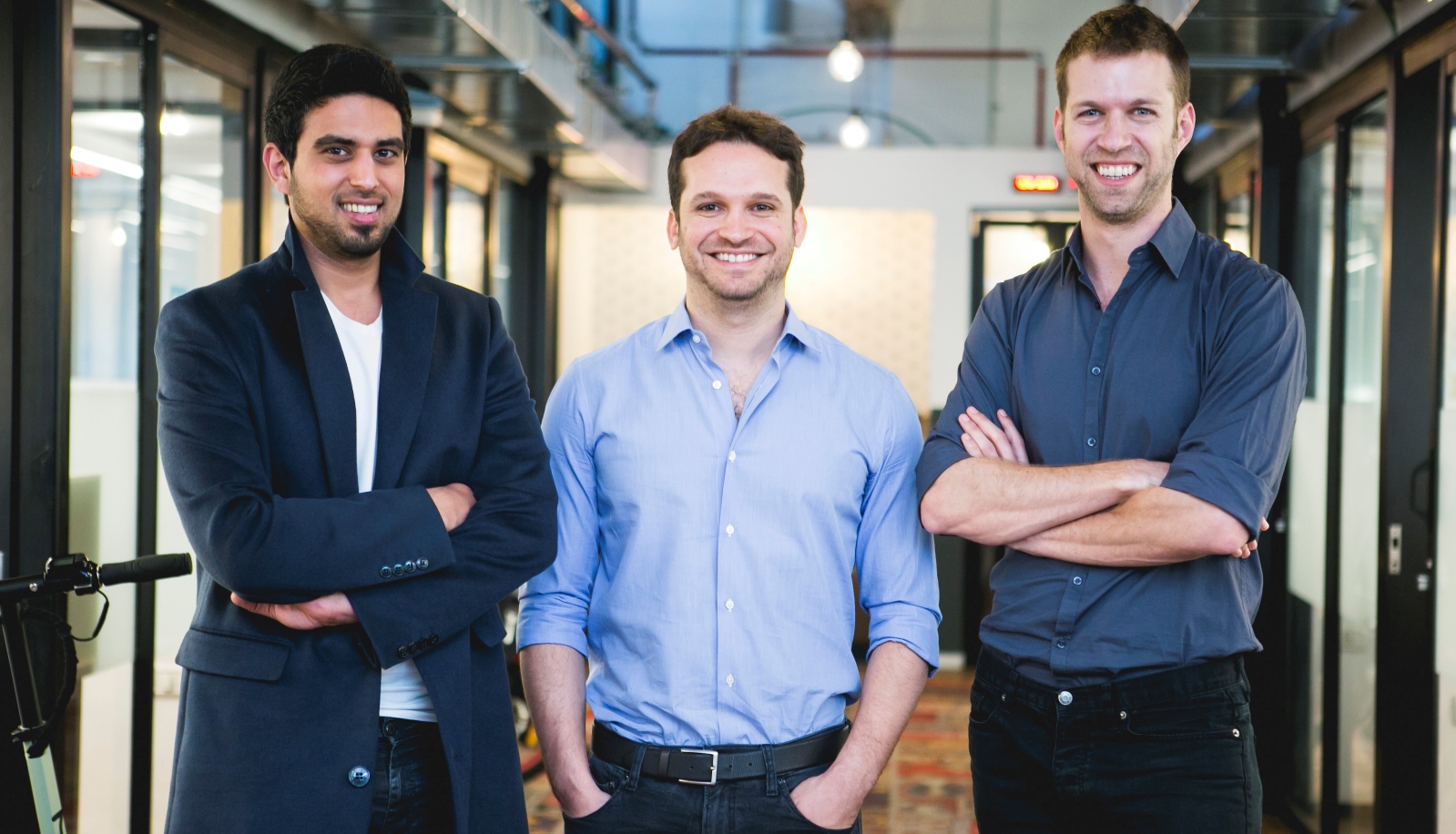
Perry and his cofounders became sensitive to the place of pictures on social media when, during a post-army trek to South America, they weren’t allowed to post pictures of themselves due to the sensitivity of their previous military positions. They came up with D-ID as a way to get around those rules and still share photos. That turned out to be big business: the company has since raised $4 million.
Let’s say you’re on the road and log in to Facebook from London. But somebody’s hijacked your phone and there’s a log in for Gmail half an hour later – from Berlin. That kind of privacy hack would generally go unnoticed by Facebook and Google, which are only watching their own services. But the LogDog knows.
By monitoring all your devices’ logins, LogDog might be the smartest puppy on the app block. It can also remind you if you forgot to log out somewhere – perhaps on a public computer in Kathmandu – and now someone else is looking at your Annapurna trek photos (or worse).
LogDog doesn’t take any direct action to keep you safe – it won’t change passwords for you – but it will send an alert when it notices suspicious activity. Though the app logs into your accounts for you, LogDog insists that no data is ever kept on its servers.
The company was founded in 2013 by Uri Brison, formerly head of user experience at Modu (the company founded by Dov Moran, inventor of the USB thumb drive). TechinAsia called LogDog one of its top 15 Israeli companies to watch.
As previously reported by ISRAEL21c, this Israeli-made mobile app alerted the parents of a 13-year-old boy in Phoenix, Arizona that their son was in a sexual relationship with his 27-year-old teacher. The Ra’anana-based Sentry Parental Control flagged suspicious content on the teenager’s phone, including sexually explicit text messages and nude photos, leading to the arrest of the teacher earlier this year.
Sentry monitors text messages on all the main social networks – Facebook, WhatsApp, Kik, Instagram and Snap – as well as SMS. It can see every photo on the device, track which apps are opened, monitor call history and update parents on where the phone is being used based on its geolocation.
CEO Michael Druker says nearly 35 percent of children have been threatened online yet many don’t report being cyberbullied to their parents. Some 5,000 children have registered to use the Sentry app.
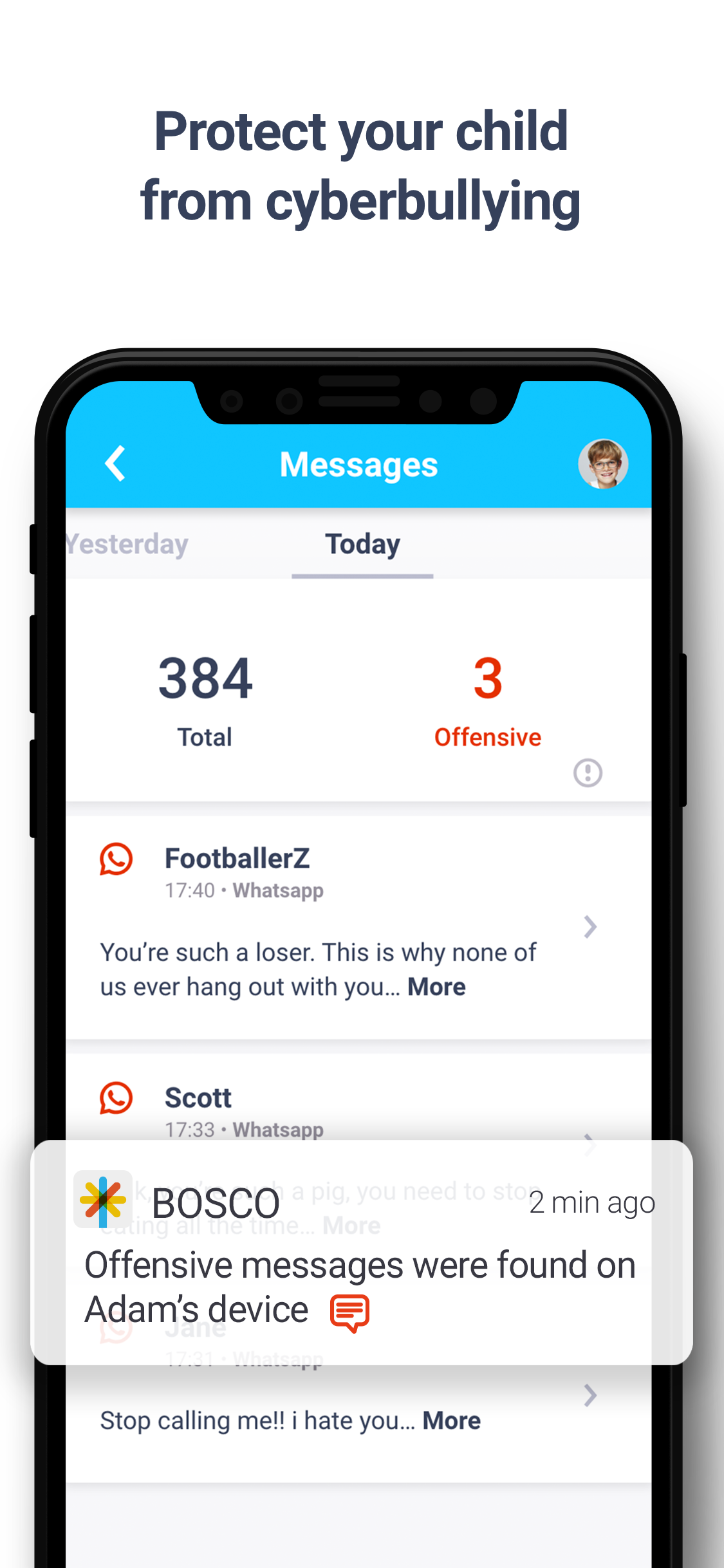
Bosco (the name comes from St. Bosco, the patron saint of children), screens calls on your child’s phone to detect “mood changes.”
Bosco starts by building a unique voice profile for the child. It can then detect changes in tone without observing the words themselves.
Bosco sends parents an alert if their child’s mood has suddenly changed for the worse – a frequent sign of cyberbullying.
It also sounds the alarm if a child has been unfriended or unfollowed by more than three friends over the previous three hours. The app accounts for differences in age, gender and culture.
Jerusalem-based Keepers Child Safety does look at the social media texts on your child’s phone, but its neuro-linguistic programming algorithm, based on IBM Watson technology, is scanning for worrisome words and only reports potential dangers, not any specific content.
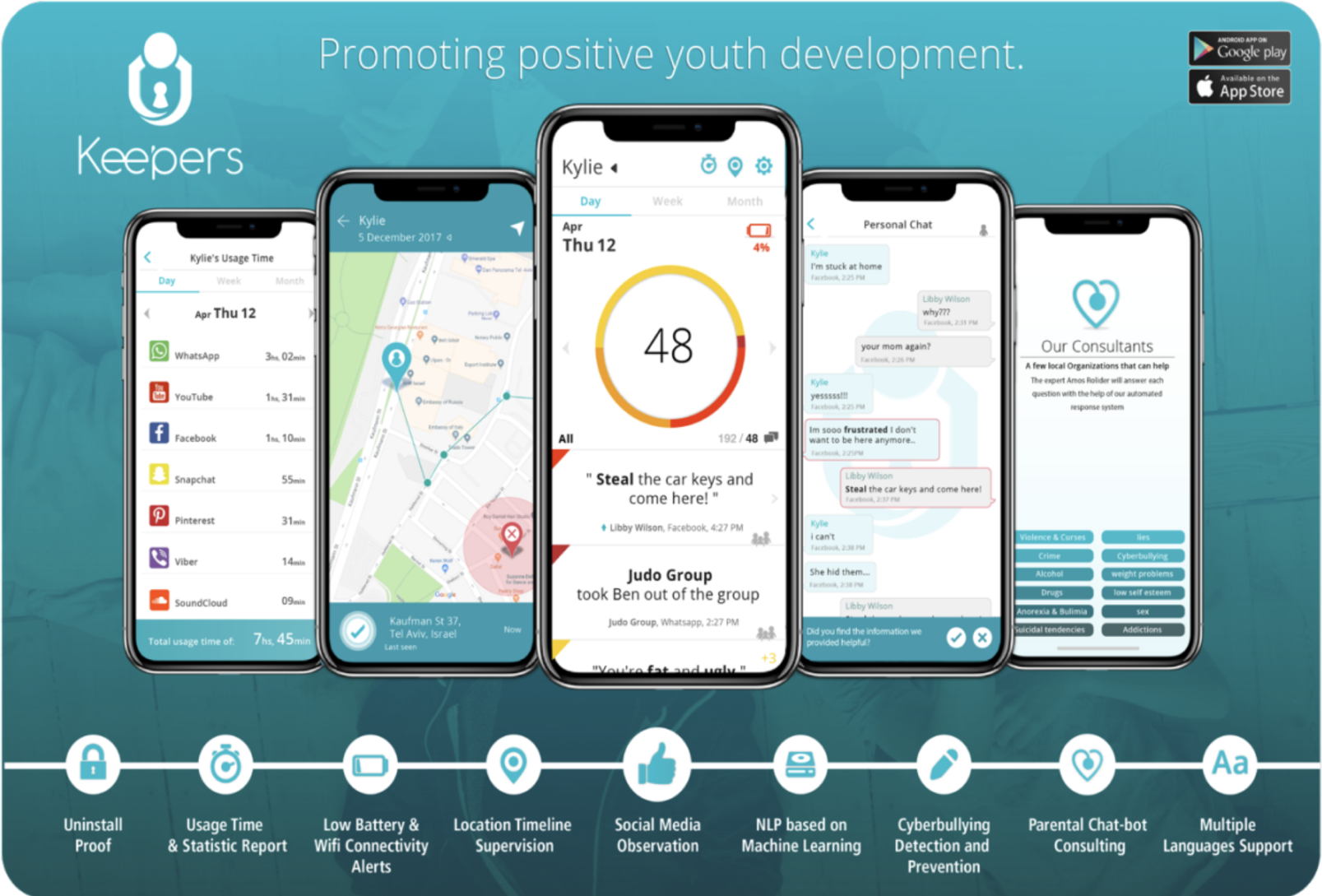
The app can also track a child’s location and alert concerned parents when the child’s phone battery drops below 10 percent. The app informs parents within 20 minutes if it detects a suspicious message, Keepers’ CEO Hanan Lipskin tells ISRAEL21c.
As long as there’s email, there will be hackers trying to “phish” your personal details. Phishing refers to a fraudulent attempt to obtain sensitive information – usernames, passwords, credit card details – by posing as someone else’s website in an email.
Tel Aviv-based Cyberfish has built a proactive detection tool that plugs into Gmail and can detect if a link you’ve received leads to a scam that could compromise your data. Fake websites are caught (and blocked) in real time; Cyberfish doesn’t rely on human intervention or (quickly outdated) blacklists. The “fish” works with cloud-based email and doesn’t mind if you’re using it on your desktop or mobile device.
With a false positive rate of less than 0.001 percent, $5 per user per month doesn’t seem like that much. Think you don’t need it? Cyberfish cites some sobering statistics: 86% of organizations report being the victim of phishing; there are 1.5 million fake phishing websites created every month; and 91% of all cyberattacks start with phishing.

















